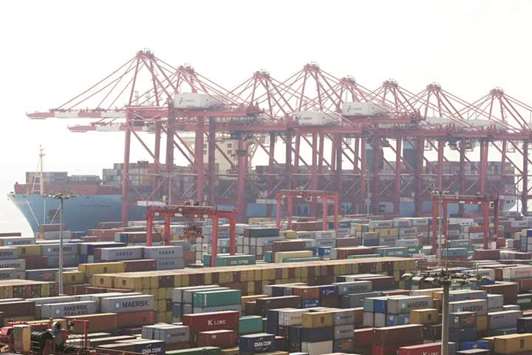China’s trade machine kicked up a gear in January after stumbling the previous month, with exports and imports both growing much more than expected, getting the economy off to a solid start to the year.
January exports rose 11.1% from a year earlier, picking up from a 10.9% gain in December, official data showed yesterday.
Analysts had expected growth to cool for a second straight month to 9.6%.
Imports surged 36.9%, the General Administration of Customs said, the fastest pace since last February and smashing analysts’ forecast of 9.8% growth.
China’s import growth had sharply decelerated to 4.5% in December, raising fears that its domestic demand was weakening. Commodities again led the way in January, with crude oil imports hitting a record and iron ore imports the second highest on record.
The figures left the country with its smallest trade surplus in 11 months at $20.34bn, compared with December’s $54.69bn and forecasts for a $54.1bn surplus in January.
The upbeat data along with last week’s strong manufacturing and service activity surveys suggest China’s broader economy remained resilient at the start of 2018 and may have even picked up some momentum, despite government crackdowns on factory pollution and on riskier types of financing that are driving up borrowing costs.
However, data from China in the first two months of the year must always be treated with caution due to business distortions caused by the timing of the long Lunar New Year holidays, which fell in late January 2017 but start in mid-February this year.
Some of the jump in imports may have been due to inventory building ahead of the holidays rather than a pick-up in consumption.
China benefited from a global trade boom in 2017, which helped its exports grow at the fastest pace since 2013.
The unexpected strength was also one of the key drivers behind the economy’s forecast-beating 6.9% expansion last year.
However, while global trade is tipped for another year of solid growth, expectations of growing disputes with the United States could weigh on China’s shipments in 2018.
Sharp gains in the yuan are also threatening China’s competitiveness, with an official business survey last week suggesting the currency’s appreciation has led to a decline in big exporters’ activity last month.
China’s import growth is also still seen moderating this year if the economy loses some steam. Imports surged nearly 16% last year, the best since 2011, thanks to China’s insatiable demand for raw materials.
The trade data also showed China’s goods surplus with the United States, a sore spot in relations between the two nations, narrowed last month.
China’s trade surplus with the US was $21.895bn, a customs spokesperson told Reuters, down from $25.55bn in December. Its 2017 surplus with the United States was $275.81bn, topping the previous record in 2015 of $260.8bn.
President Donald Trump slapped steep tariffs on imported washing machines and solar panels last month.
China is the world’s biggest solar panel producer.
In response, China’s commerce ministry launched an anti-dumping and anti-subsidy probe into imports of sorghum from the US over the weekend.
The moves have rekindled concerns of a Sino-US trade war.

Maersk’s Triple-E giant container ship, Majestic Maersk, is seen at the Yangshan Deep Water Port, part of the Shanghai Free Trade Zone. China’s January exports rose 11.1% from a year earlier, picking up from a 10.9% gain in December, official data showed yesterday.
